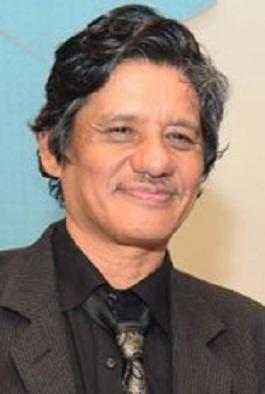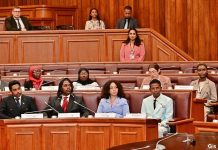Africa-Press – Mauritius. A triangular struggle was the norm from 1959 to 1982. With the exception of 1967, the ‘independence elections’, all elections, including that of 1982, were triangular struggles.
It is true that in 1963, the PMSD had not proposed candidates in certain constituencies to give carte blanche to the IFB against the PTr-CAM, but there was no formal alliance between the two parties.
In fact, if politics revolved around the game of alliances from 1983 onwards, it was largely due to the MSM which, having at most only 20% of the electorate, was very skillfully going to do and undo pre-election strategic alliances as elections go by to stay in power.
It is true that in the current situation, the outcome of the general elections is still uncertain whereas in 1982, one could easily predict a tidal wave MMM-PSM against the PAN (National Alliance Party) led by SSR d one side and PMSD on the other. Today, there has been a shrinking of party hardcore and an increase in the number of undecided.
Add to this the population migrations from the cities to the coastal regions, the impact of the displacement and the concentration of artisans of the sugar industry towards certain constituencies in favor of the VRS and the progression of the evangelicals whose identity is very little known.
policy… Very smart one who can predict the results of the elections even in rural areas! Lindsay Rivière: ‘Bérenger will not ‘save’ Jugnauth from defeat’
You have to know and remember that the current does not pass at all between Pravind Jugnauth personally and Paul Bérenger. The PM has been insulting the leader of the MMM for years (most recently calling him an ‘intellectual crook’ and a ‘whisker shark’ in Parliament.
It is clear that he does not want to have him between his government or even let Bérenger rob him of his victory in 2019, even as he begins to free himself from his father and take the country well in hand.
As for Paul Bérenger, he has a deep contempt for Pravind Jugnauth; he often called him a ‘little moron’ while thinking it and he never deemed him up to it or worthy of the office of prime minister.
Admittedly, Paul Bérenger has a lot against Sir Anerood Jugnauth but he respects his old adversary. With Pravind, this is not the case. He feels that they are not playing in the same league.
There is something else: Paul Bérenger will always prefer the PTr to the MSM, moreover for his greatest misfortune! He will not ‘save’ Pravind Jugnauth from defeat, especially if it seems inexorable.
Today, with the three-way elections of 2019, Bérenger has a unique opportunity to ‘finish off’ Pravind Jugnauth and the MSM, to settle all his historical accounts with the orange party, to take revenge for all his humiliations at the hands of of the Jugnauths.
Finally, consider one last thing: If the MSM is beaten by the Labor Party in seats and votes, and if the MMM performs very well, the purple party will regain its status as one of the two largest political parties in the country and Paul Bérenger would again become Leader of the Opposition against his friend Navin Ramgoolam and Xavier Duval.
This is a scenario that suits both the MMM and the PTr, both Bérenger and Ramgoolam. Catherine Boudet: Towards an ethics of the electoral promise The electoral promise remains an accepted practice in the political culture due to a demanding electorate and a relatively flexible legal framework.
Nevertheless, the recent fiery debates on social networks around the Rs 13,500 pension show that this conception of things is gradually changing in Mauritius, even if we are still far from the legislation of countries like the Philippines which are went so far as to criminalize the practice of giving electoral gifts.
Thus, in the Philippines, article 261 of the Omnibus Election Code declares the electoral promise to the public as illegal and reprehensible, making it guilty of a misdemeanour.
In the Mauritian context, it is however useful to recall that the Electoral Code of Conduct published in 2010 by the Electoral Supervisory Commission stipulates in its article 3.2.
g “Duty of Participants” that in the exercise of their electoral campaign, the candidates must to abstain “from having recourse to false and unrealizable electoral promises”. It is therefore up to the candidates to argue the feasibility and budgeting of their promises to voters.
Going ahead of the legal frameworks, the public debate is gradually drawing the contours of the legitimacy of the political offer in Mauritius and of an ethics of electoral promise.
Sada Reddi: ‘From paymasters, financial backers want to become players in their own right’ In the past, the financial backers were content to pull the strings from behind the curtain and reduce government to being a mere puppet in their hands.
They preferred to remain invisible and one could only come across their shadows in the corridors of power. At present they seem to have even lost their former scruples, and a few of them can hardly resist the temptation to stand as candidates.
From paymasters, they want to become players in their own right. Financial institutions too have joined the fray and become involved in money politics in their own way.
They try to buy off potential candidates, deter others from standing as candidates of parties they do not approve of and even seek to win them by lightening any of their financial liabilities.
No wonder some candidate may allegedly easily win the lotto without buying any ticket, and this as fast as lightning. With so many shifty candidates around, the selection of candidates has become a headache for the party leadership.
This explains the caution exercised by party leaders in their choice of candidates. Some may go to the other extreme of valuing loyalty over competence and disregarding the unanimous voices of the electorate even when such voices are well known.
Wrong choices will be catastrophic for the party’s interests and eventually for the national interest. In what is going to be a major election that will decide our democratic future, some parties may continue to reward loyalties but not by putting them on the battlefront where they could spell disaster for the party.
Kugan Parapen: ‘Beware of surprises!’ I strongly refute the ‘three-cornered electoral battle’ appellation of the upcoming elections. I believe that the 2019 elections can be the time when Mauritius finally moves into multipartyism.
I have always been an ardent advocate of post-electoral coalitions as they serve a better purpose than the fake pre-electoral recipes we have been served with since 1976. 2014 was a stark reminder that pre-electoral alliances do not always add up.
It is thus a logical step that most political parties stand on their own feet at the upcoming elections. We believe that they will be a multi-cornered electoral battle as opposed to a three-cornered one.
Beware of surprises! Manou Bheenick: ‘A sitting government doesn’t give up without a fight’ A sitting government, no matter how incompetent, doesn’t give up without a fight.
That’s just not cricket! They will fight tooth and nail, armed as they will be with a war chest of unequaled proportions. The opposition parties, all of them, are seriously disadvantaged on this score.
The opacity surrounding large public sector projects may have a direct incidence on party funding, especially when you factor in the fact that the main contractor for the largest, most opaque, and most expeditious project of this regime was actually blacklisted for reasons of corruption and barred from bidding for World Bank projects.
(…) The silent majority is slowly coming out of its shell.
The fear factor that kept even dyed-in-the-wool party stalwarts from attending public party rallies because of the risk of severe reprisals against them, or their families, or their businesses, by the state machinery is rapidly dying out…
For More News And Analysis About Mauritius Follow Africa-Press







